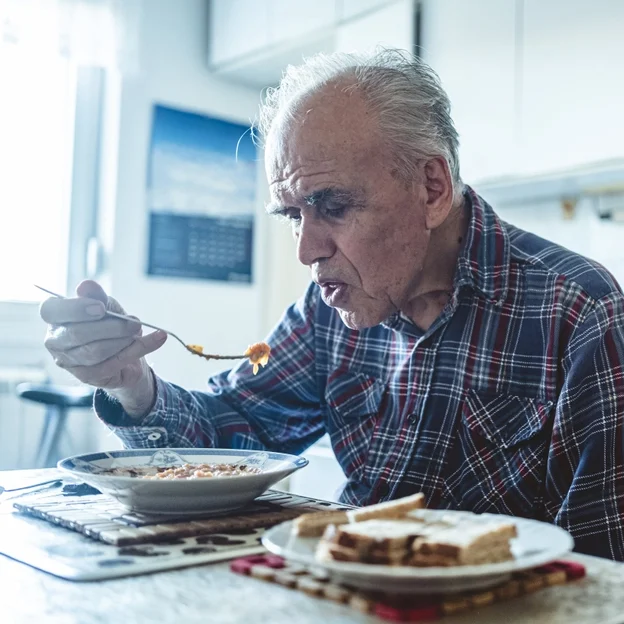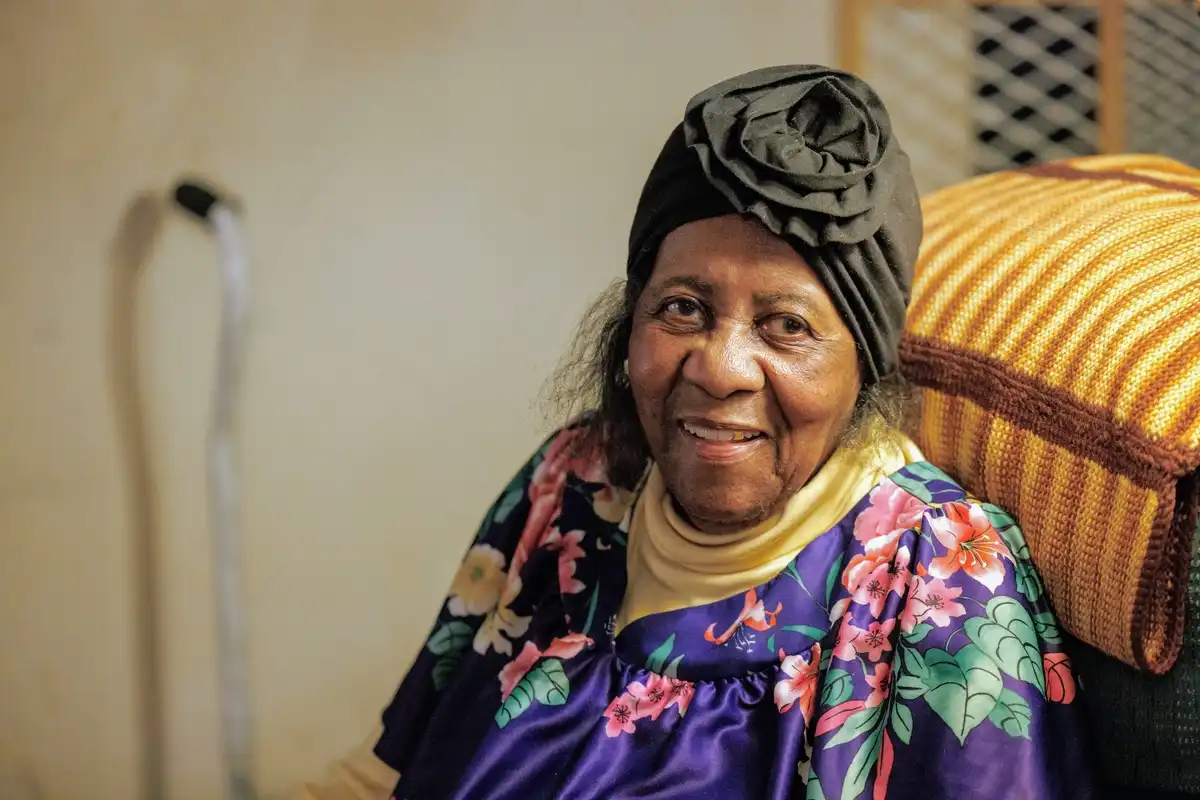Good nutrition is essential for staying healthy and independent as we get older. The right balance of nutrients helps older adults maintain strength, energy and overall well-being. Proper nutrition also lowers the risk of health problems, improves mobility and supports mental health.
As we grow older, our nutritional needs change. Seniors often need fewer calories but more nutrients like protein, fiber and vitamins. But getting the right nutrition isn’t always easy. Many seniors face challenges like a loss of appetite, trouble cooking or limited access to healthy food.
That’s why Meals on Wheels places such a strong focus on providing nutritious, age-appropriate meals, ensuring seniors receive adequate nutrients that align with current dietary guidelines.
Impact that Starts with a Meal
Meals on Wheels operates in virtually every community across the country. Annually, our network delivers 244 million meals to 2.6 million seniors.
91% of home-delivered meal participants say the meals help them live independently
79% say the meals help them improve their health
81% say they eat healthier foods as a result of the meals program

ON THE ISSUE
Hunger and Malnutrition
No one should have to go hungry. But for some older adults, getting healthy food is not easy. For many seniors, things like limited transportation, health problems or mobility issues make these tasks much harder.
We know that good nutrition is the cornerstone of a healthy life. Yet, hunger and malnutrition among seniors in America are a growing crisis.
Thanks to Meals on Wheels, I get a good, hot meal every day.Meals on Wheels client
Local Meals on Wheels providers offer more than just food — they also offer nutrition, connection and care. For seniors who are homebound or have difficulty shopping and cooking, home-delivered meals are a lifeline. Often, Meals on Wheels providers cater to specific dietary needs that result from having conditions like diabetes, heart disease or swallowing difficulties, ensuring seniors receive adequate nutrients in portion-controlled servings that align with current dietary guidelines. These nutritious, age-appropriate meals help keep them healthy and independent. Volunteers who deliver the meals also provide a friendly check-in, helping to reduce isolation and offer peace of mind.
I don’t think I’d eat so many vegetables on my own. When you retire, you get kind of spoiled. Ice cream starts looking like a vegetable. So, I’m staying healthy in many ways because of the balanced diet.Meals on Wheels client
While many people associate Meals on Wheels with home-delivered meals, many local providers offer community dining programs. These give seniors a chance to share meals and connect with others. Community dining programs provide an important option for seniors who are able to get out and about. These group meals bring people together to enjoy nutritious meals in a social setting. For many, it’s a vital part of their day, offering not just food but also friendship and a sense of belonging.
Whether through home-delivered meals or community dining, Meals on Wheels ensures seniors get the nutrition meals and moments of connection they need to thrive.

SAVORING CONNECTION
“Give Me a Recipe.”
Inez McLean has made her home in Aroostook County, Maine, for most of her life. Living alone with limited mobility was scary and lonely for Inez, but once she got off the waitlist for her local Meals on Wheels provider, things changed drastically.
Today, she receives a biweekly delivery of nutritious meals from Meals on Wheels. She especially loves the spicy options.
“I like anything that’s got a little heat to it,” Inez says. “They have that Thai coconut chicken with the jasmine rice. I like it. Some seniors might not because it is hot, but I like it.”
Delivering Tailored Nutrition
Every senior has unique health and nutrition needs. That’s why Meals on Wheels providers focus on delivering meals that help older adults stay healthy, manage illnesses and age well. Offerings vary by each provider.
Healthy Meals
Meals on Wheels delivers healthy meals made specifically for older adults. These meals are balanced, portion-controlled, and follow the latest nutrition and hydration guidelines. In many cases, providers also cater to clients’ personal needs and requests.
Tailored Meals
Some meals are tailored to fit cultural or medical needs. Culturally tailored meals include foods that match religious, lifestyle or regional preferences. Medically tailored meals are made to support specific health conditions, like diabetes, heart disease or difficulty swallowing.
Supplements
Many Meals on Wheels providers also offer ready-to-drink supplements to help seniors get the nutrients they need. These drinks are designed to meet 100% of daily nutrition requirements and are given under a registered dietitian nutritionist supervision.
Education
Nutrition education helps seniors make better food and activity choices. This is required for federally funded programs and teaches ways to improve health and manage nutrition-related conditions.
Counseling
Seniors can also get one-on-one help with planning meals and managing their health. Nutrition counseling is provided by a registered dietitian nutritionist and helps older adults meet their daily nutrition needs, stay healthy and lower the risk of chronic diseases.

Research Spotlight
The Case for Meals on Wheels
Meals on Wheels is an evidence-supported, cost-effective solution to senior hunger and isolation. Research consistently demonstrates Meals on Wheels’ efficacy in improving food security and diet quality, reducing use of costly health care services, and reducing social isolation and loneliness. By fostering social connections, providing safety checks and delivering nutritious meals, Meals on Wheels supports older adults to help them maintain their health, independence and ability to age in their own homes and communities.
Our Work: Advocacy
Meals on Wheels America is continuously engaged in protecting and strengthening federal support through our involvement in national advocacy efforts, the legislative process and federal policy decision-making. But we need your help to fund and protect the programs that support older adults.
The Growing Need: More Seniors Are Waiting for Nutritious Meals
Meals on Wheels providers work tirelessly to serve older adults, but rising costs and growing demand make it harder every day. From food prices to transportation expenses, the cost of providing nutritious meals continues to climb. At the same time, more seniors are relying on Meals on Wheels for help.
Currently, Meals on Wheels providers serve more than 2 million seniors across the country. While this is an incredible feat, it’s still not enough. Local providers are feeling the strain, and many are struggling to meet the demand.
In fact, 1 in 3 Meals on Wheels providers now has a waitlist. This means many seniors who need meals and support are forced to wait — sometimes for months — before they can get help. And it’s not just about nutritious food. For many, these programs also provide the connection and care that keep them healthy and independent.
The need is undeniable. A survey found that 97% of Meals on Wheels providers believe there is still unmet need in their communities.3 Despite their efforts to reach as many seniors in need as possible, too many are going without the nutrition and support they need to age with independence and dignity.

THE CRISIS OF WAITING
“We Do Everything We Can.”
Meals on Wheels providers across the country are facing a growing crisis. Rising demand, fewer volunteers and limited funding have led to ballooning waitlists.
For organizations managing these waitlists, the hardest part is telling seniors they can’t help right away. Instead of delivering meals, they have to deliver heartbreaking news.
“We have to look people in the eye and say, ‘We don’t have the money. We can’t provide this service, and we’ll keep in touch with you and try to ensure we do everything we can to help you as soon as possible.’” — Local Meals on Wheels Executive Director, Joy Barressi
With more help, Meals on Wheels providers could reach more seniors and truly transform the way we care for older adults.
Help Us End the Wait™
Right now, too many seniors are waiting for the meals and care they desperately need. Meals on Wheels providers are ready to serve more older adults, but we need your help to make it happen. Your support can help End the Wait and provide life-changing services to seniors in your community. Together, we can ensure every senior has access to nutrition and meaningful connections.
Citations
- “244 million meals served annually” and “2.6 million seniors served annually” are from Administration for Community Living Aging, Independence, and Disability (AGID) Data Portal Data Explorer. Filters: Data Set: State Performance Reports (SPR) (Title III); Years: 2024; Geography: all U.S. Totals, 50 States + DC & Territories; Data Elements: Older Adults Persons and Units –> Total Persons by Service –> Congregate Meals and Home Delivered Meals, Older Adults Persons and Units –>Total Service Units and Total Persons Served by Service –> Congregate Meals and Home Delivered Meals. Data available at: https://agid.acl.gov/data-explorer Accessed 10/14/2025.
- 2023 Administration for Community Living (ACL) National Survey of Older Americans Act (OAA) Participants. Figures are from the responses of a nationally representative sample of clients receiving Home-delivered meals funded through Title III of the OAA. Data obtained through special ACL request.
- Meals on Wheels America 2021 Comprehensive Network Survey conducted by Trailblazer Research. Figure includes respondents that said they were serving fewer than “all” seniors in their market who need nutrition services (includes programs that were serving “some,” “many” or “most” seniors). (N=478). Report summary: 2021 Member Perspectives and Practices Survey

